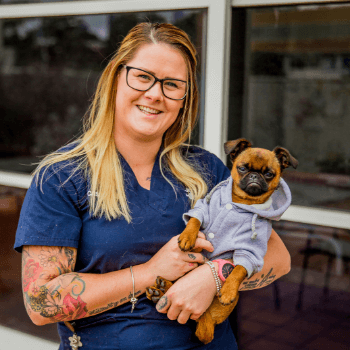We all love our pets; and as responsible pet carers we all do our best to keep them out of trouble. However, at some point almost every pet carer will be faced with their pet being injured. Hopefully these injuries are minor and can be taken care of quickly so your pet can get on the fast road to recovery.
Many accidents require veterinary attention, but there are things you can do at home before bringing them to your vet. Below are some of the more straightforward accidents that you can help your pet with at home.
Basic cuts/wounds
What to do when your pet receives a cut or abrasion:
1. Fit muzzle
Even the most placid of canines may lash out if they are experiencing pain. If you have a muzzle at hand, use it. If not, you can fashion one out of a necktie, pair of pantyhose, or a length of soft rope.
2. Control bleeding
The concept of stopping bleeding in a pet is the same as it is in a human. Use steady pressure with a clean piece of gauze or a towel (depending on the size of the wound). For bleeding on limbs you can also elevate the limb to slow the blood flow and aid in clotting. For a wound that is bleeding heavily you should seek veterinary attention as soon as possible.
3. Clean wound
In the case of superficial wounds or abrasions (which can even be caused by irritation due to the rubbing of a collar, scratching, etc), you can treat them much like you would your own skin. Wash them with warm water and antibacterial soap.
Bite wounds, serious lacerations and deep cuts all have a potential of becoming infected and need to be treated by a veterinarian.
Burns
If you pet sustains a heat or chemical burn then flush area under cool running water tap for at least 10 minutes and seek veterinary treatment.
Seizures
Use your voice to calm your pet but do not try to stop the seizure. Make sure the animal cannot hurt itself by moving any objects away from them – including furniture. Do not restrain the pet. Time the seizure. After the seizure has stopped, keep your pet quiet and calm and contact your veterinarian.
Poisoning
If your pet has been poisoned, contact your vet immediately. Frequently used medication such as paracetamol and ibuprofen are toxic to cats and dogs. It is crucial to act fast because some poisonings can cause death.
Bee/wasp stings
Pets, particularly dogs, are curious creatures. They love to run and chase things including insects, which in some cases protect themselves by stinging.
Most of the time pets get stung on their faces from investigating a stinging insect too closely. They may even get stung on the tongue or inside their mouth or throat if they try to bite or catch an insect.
Signs to watch out for:
- itchiness
- hives/welts on the skin
- swollen eyes
- vomiting
- diarrhoea
- breathing problems
- collapse.
If it’s just mild itchiness or swelling (that isn’t present on or around their face), and your pet isn’t too uncomfortable with it, you may be able to treat them at home. If the swelling is wide-spread (especially around the face and/or neck), the itchiness intense, or there are any digestive signs, breathing problems, or collapse, your pet needs to be seen immediately by a vet.
Additionally there are pet first aid apps that you can download for free. It covers first aid for both cats and dogs.
Free pet first aid app for Apple devices:
https://itunes.apple.com/au/app/first-aid-for-pets/id799460675?mt=8
For Android devices:
https://play.google.com/store/apps/details?id=com.boehringer.FirstAidForPets&hl=en
Lort Smith Animal Hospital is open every day of the year from 8:30am until midnight for emergency cases – these do not require an appointment. We have a dedicated team of emergency vets and nurses throughout the day who specifically treat emergency cases.
Conditions that may be classified as an emergency include when pets have collapsed, or are fitting; are experiencing breathing difficulties; suspected to have been hit by a car; dog attacks; poisonings; open wound from trauma; inability to walk or stand; inability or straining to urinate; or abnormal bleeding.
If it is possible and safe to do so, please try to ring ahead on 03 9328 3021 to let us know you are on your way, or if you are not 100% sure whether it is an emergency. If you are worried, please do not hesitate in bringing your pet in to the hospital – every minute counts.
